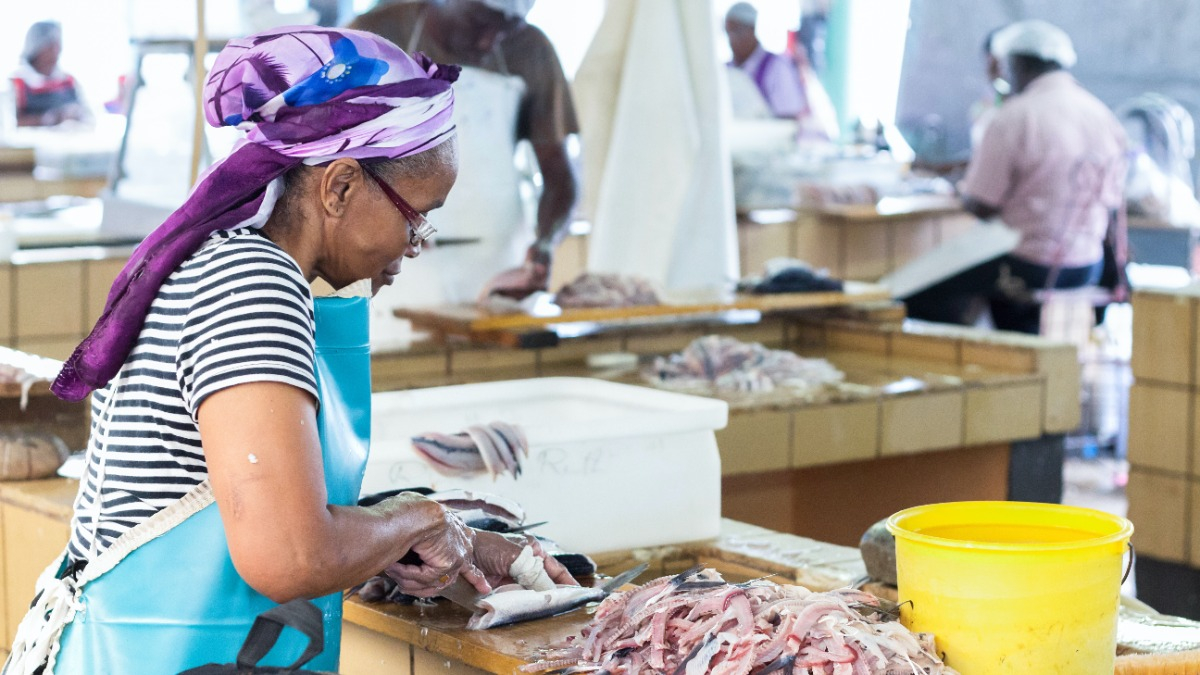Targeted policy strategies and closer cooperation with other developing countries are essential to boosting the country’s resilience to economic shocks.
© Shutterstock/Ruben Ramos | A worker prepares fish for sale in a market in Bridgetown, Barbados.
UNCTAD has been working on several strategies to strengthen economic diversification in Barbados, as it and other Caribbean nations face an increasingly challenging post-pandemic global environment.
Economic diversification is key to reach sustained growth for tourism-dependent Barbados, which faced a 17.6% drop in real GDP during 2020, following a decade of sluggish growth caused by the global financial crisis of 2008-2009.
Economists and high-level government officials from national, regional and international institutions discussed potential strategies at a recent workshop in the capital, Bridgetown.
“Economic diversification requires integrated and targeted strategies that are tailored to the situation in Barbados and other Caribbean economies. That is exactly what UNCTAD aims to support through our policy analysis and by facilitating peer learning among developing countries,” said Richard Kozul-Wright, director of UNCTAD’s division on globalization and development strategies.
He said UNCTAD would help set Barbados on a more sustainable growth path, based on South-South economic cooperation, regional integration, digital transformation and targeted sectoral policies.
New drivers of economic growth vital
Experts noted that creating new drivers of economic growth was critical for Barbados and other small island developing states, due to multiple external challenges in the post-pandemic global economy.
These include interest rates hikes, inflationary pressure, rising food and fuel prices and a worsening climate crisis.
The workshop was part of an UNCTAD project implemented in partnership with the Barbadian government, with funding from China’s Global Development and South-South Cooperation Assistance Fund.
Ryan Straughn, the country’s minister of finance and economic affairs, reaffirmed Barbados’ intention to reform and reshape its economy and recognized the relevance of the UNCTAD project to this journey.
Xinhua Huang, deputy chief in the Chinese embassy in Barbados underlined China’s commitment to increasing its funds for global development and South-South cooperation.
UNCTAD policy recommendations
Digital transformation policy recommendations focused on building new infrastructure and capability, promoting inclusive e-commerce platforms and payment systems, learning from other developing countries’ experiences on e-government and adopting suitable data laws and regulations.
Given the limited domestic market and economies of scale, regional integration with other Caribbean economies is essential for Barbados’ economic diversification. Through regional integration, Barbados and regional partners could better align their national priorities.
For example, an industrial policy strategy at the level of the Caribbean Community (CARICOM) would help develop regional value chains, create positive linkages among sectors and economies, and use regional natural resources more efficiently.
For Barbados, strengthening regional value chains in tourism, agribusiness and selective manufacturing sectors would increase opportunities for trade within the Latin American and the Caribbean region.
South-South cooperation also offers opportunities for Barbados. CARICOM and the African Union have unveiled a joint plan to strengthen economic ties between the two regions.
With the increasing significance of developing countries in the global economy, promoting greater South-South cooperation at the global level such as scaling up South-South trade, investment, financial and industrial cooperation could generate more diversified development resources.
Barbados and other Caribbean countries can also play a strong role through South-South cooperation to advance more inclusive global governance and multilateralism.

